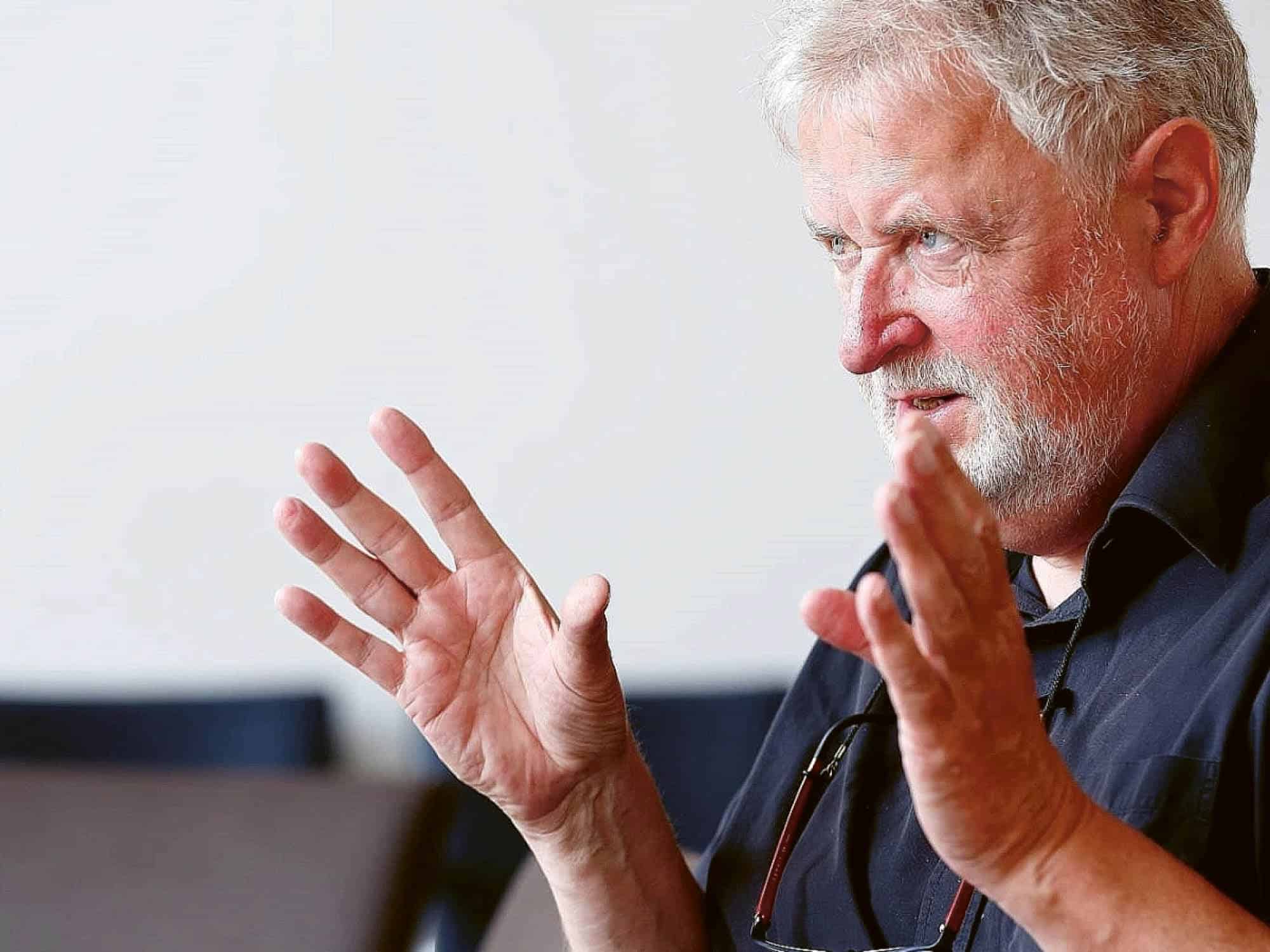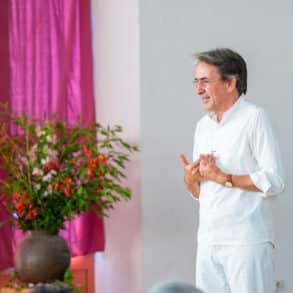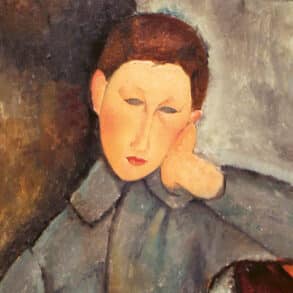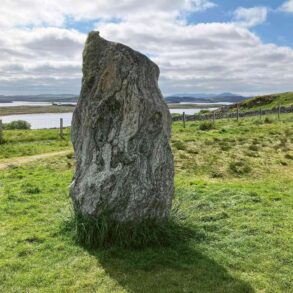He loved human beings. Justice was a matter of the heart.
The splendor of the dawn,
the colors of the rainbow,
the silver glow of the moon,
the song of the nightingales,
the softness of a cat’s paw.
These words of gentle power describe how the Aesir of Norse mythology held the Midgard serpent, which symbolized the outer and inner un-freedoms of human beings. Ingo Krampen used them to characterize the qualities of a law that has a peacemaking effect and is based on responsibility and trust: the two factors that, in a future legal system, could replace the current and, actually, outdated law of obligations.
Ingo Krampen met Wilhelm Ernst Barkhoff, the father of his classmate Martin Barkhoff, when he was still at school. Wilhelm Ernst Barkhoff was a lawyer and enthusiastic anthroposophist. He held the view that “jurisprudence and anthroposophy are identical.”1 Ingo Krampen thought this was a bold statement, but his life and life’s work proved this statement to be true. The focus of his discussions with Wilhelm Ernst Barkhoff was The Philosophy of Freedom: What is thinking? What does it mean that thinking is an activity of the soul? What possibilities do we have to overcome the limits of scientific thinking? Do Imagination, Inspiration, and Intuition have the potential to expand our thinking? These questions of The Philosophy of Freedom accompanied Ingo Krampen throughout his life. He also brought them into the Anthroposophical University Seminar (Anthroposophische Hochschulseminar) that he co-organized in Bochum, Germany.
Ingo Krampen was never a theorist and was certainly no dogmatist. He was interested in human beings, in the communities in which he found himself, and in societal issues. Of great importance to him (as it was for all its participants) was a 15-year membership in an economic community where everyone managed all matters personally and lived off one shared account (clearly, this was only possible with a great deal of humor!) He himself felt that his time as a Waldorf student at the Rudolf Steiner School in Bochum was of fundamental importance for his life. The school began in 1958, and he was one of its first pupils. There, he met his class teacher, Lore Schäfer, who showed unconditional love for every pupil and was both practical and full of humor. In the early 1980s, Ingo Krampen himself was involved in the founding of the Vidar School, a Waldorf school in Bochum-Wattenscheid.
Ingo was also a child of his time. As a student, he associated himself with the goals of the West German student movement of 1968, protested against the German Emergency Acts, sat in protest on tramway tracks, and campaigned for student representation at his Waldorf school. Ingo Krampen played a key role in the founding of GLS-Bank in Bochum, “The first sustainable bank in Germany . . . founded in 1974.” As a student in 1975, at the age of 24, he became a member of the Executive Board of GLS-Treuhand [GLS-Trust] (at the time, known as Gemeinnützige Treuhandstelle [Non-Profit Trust Company], founded in 1961). He remained in this position for a period of 25 years, moved to the Supervisory Board of GLS-Trust, and became its Chairman. In 1999, he became a member and Chairman of the Supervisory Board of Hannoversche Kassen [Hanover Mutual Insurance].2 When he started working for the Trust and became a member of the Monday Circle, in which the people involved in founding the bank further developed the methodological and practical foundations of banking, he began to focus on the topic of money. The discussions focused on the qualities of money (purchase, loan, and gift money), questions of the economic cycle, and Social Threefolding on the basis of Rudolf Steiner’s statements. The discussions often went on late into the night.
Ingo Krampen was also a “traveler” for the Trust. On weekends, he traveled with Rolf Kerler, Albert Fink, Wilhelm Ernst Barkhoff, Gisela Reuther, and others to various places in Germany, visiting branches of the Anthroposophical Society, institutions, and businesses and promoting the aims of the Trust and the GLS-Bank, which was in the process of being founded at the time. Above all, he was interested in the future-oriented quality of gift money: What is the essence of gift money? What attracts gift money?3
What Qualities Did Ingo Krampen Have?
Ingo Krampen was a lawyer with body and soul. In addition to banking law, his work as a lawyer focused primarily on the law governing independent schools, educational institutions, associations and societies, non-profit law, and family law. Mediation increasingly became the focus of his work as a lawyer. His outstanding skills as a mediator helped to lead countless people in institutions and communities out of crises and conflict situations. He owed his success as a mediator to his unbiased, appreciative, and balancing nature. He was able to carry a person in his soul, which often resulted in him helping them to the right places in institutions he was helping to direct.
He saw his legal work as an anthroposophical training path. He entitled one of his last publications “Liebe deinen Nächsten als Dich selbst oder: Wie werde ich gemeinschaftsfähig?” [Love your neighbor as yourself or: How do I become capable of community?]4 In the article, he writes: “If I love another human being how I love myself, this remains abstract. Yes, I concede to him that he has the same rights as I do and that he is on an equal footing with me. But, the other person is and remains beyond the boundaries of my ‘I,’ and I am within the restricted area of my individuality. If, on the other hand, I love the other human being as myself, then they are within the realm of my ‘I’. This gives the community—or, more precisely, each and every individual in the community—a completely different value than before. We are no longer kings or queens who claim unlimited freedom over everyone else, rather we learn to be “royal children”5 who, despite all the catastrophes in nature and society, do not drown if we choose to come together. We learn, each of us, to love and value the other as part of our own self.”
All these qualities culminated in decades of active membership of the Section for Social Sciences at the Goetheanum. His book Recht-schaffend werden: Aufbruch zu einer Rechtskultur der Verantwortung und des Vertrauens [Becoming law-creating: Towards a legal culture of responsibility and trust], published shortly before he left the Earth, appears as his spiritual and social legacy.6 As his last word, he describes here his “dream of the law of the future.” These final words would not be Ingo Krampen’s unless they also contained concrete techniques and practical methods for finding a new law. With this book, he encourages us to take to heart the motto that he exemplified: Learning to work, working to learn.
If, on the other hand, I love the other human being as myself, then they are within the realm of my ‘I’.
Translation Joshua Kelberman
Photo Ingo Krampen
Footnotes
- Quoted from Ingo Krampen, “Obituary of Wilhelm Ernst Barkhoff,” Bankspiegel [Bank mirror] 147 (November 1994), supplement.
- GLS-Bank. GLS-Treuhand [GLS-Trust]. Hannoversche Kassen [Hanover Mutual Insurance].
- Cf. Ingo Krampen and Axel Janitzki, “Verantwortung und Vertrauen: Schenken, Stiften, und Vererben als juristisches Neuland” [Responsibility and trust: Giving, donating, and bequeathing as new legal territory] in GLS-Trust, ed., Da hilft nur Schenken [Only giving can help] (Frankfurt: Info3, 2011), 56 ff.
- Ingo Krampen, “Liebe deinen Nächsten als Dich selbst oder: Wie werde ich gemeinschaftsfähig?” [Love your neighbor as yourself or: How do I become capable of community?], Das Goetheanum 50 (Dec. 9, 2020).
- Ingo Krampen gladly took up this expression from Gerald Häfner’s lecture, “Wir armen Königskinder: Corona und die Herausforderungen unserer Zeit” [We poor, royal children: Corona and the challenges of our time] The Goetheanum (October 26, 2020).
- Ingo Krampen, Recht-schaffend werden: Aufbruch zu einer Rechtskultur der Verantwortung und des Vertrauens [Becoming law-creating: Towards a legal culture of responsibility and trust] (Frankfurt a. M.: Info3, 2024).









